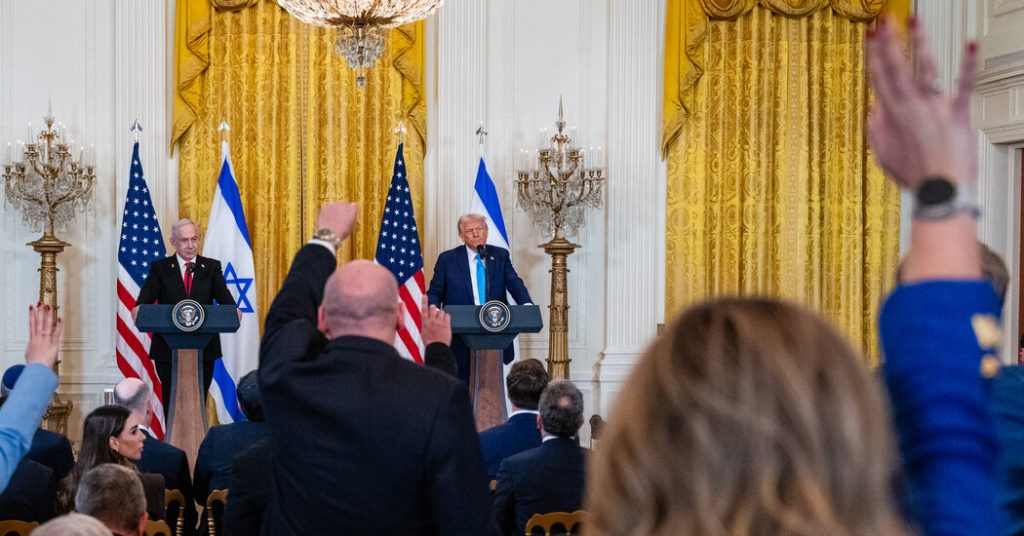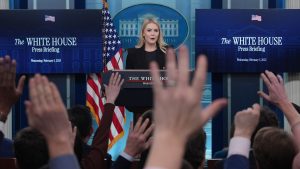President Trump’s stunning proposal to seize control of Gaza sent shock waves through American politics on Wednesday, upending decades of bipartisan foreign policy consensus over the United States’ role in the region and testing the sprawling coalition that sent Mr. Trump to the White House last fall.
The president’s words — delivered at a 40-minute news conference on Tuesday night with classic Trumpian bombast — exploded the bounds of the country’s debate over one of the world’s most intractable conflicts and immediately set off infighting in both parties.
Already, the Hamas-led Oct. 7 attacks and Israel’s devastating response in Gaza had propelled the war into the center of the 2024 election, fracturing the Democratic Party and creating improbable new political alliances as some Arab American and Jewish voters shifted to the right.
But a new wave of recriminations arrived on Wednesday, even as skepticism abounded about the president’s far-fetched proposal. Politicians and activists traded attacks and fought over whether this vision squared with Mr. Trump’s “America First” brand, which has always revolved around his promise to extricate the nation from foreign wars.
From the right, Mr. Trump received perhaps the sharpest Republican pushback of his nascent presidency, which has so far been defined by his party’s complete fealty to him. Some anti-interventionist lawmakers like Senator Rand Paul of Kentucky bristled at the idea. More hawkish leaders, like Senator Lindsey Graham of South Carolina, suggested that the proposal might simply be a nonstarter.
And on the left, some Democrats criticized the Arab and Muslim Americans, progressives and others who opposed Vice President Kamala Harris in protest of the Biden administration’s support for Israel — “is this what you wanted?” the argument went — as others vigorously defended that choice.
James Zogby, a member of the Democratic National Committee and a founder of the Arab American Institute, was unsparing toward those who cast a protest vote.
“There was a need to recognize the danger of Trump and some folks in my community, some hustlers, were deliberately deluding themselves and others into thinking this was actually going to be a protest vote,” Mr. Zogby said. “It was a vote for suicide. They were helping to drive the car off the cliff and taking the community and the country with them.”
But in interviews on Wednesday, several Arab and Muslim American leaders or activists who voted for Mr. Trump stood by him. Some doubted that he would follow through on his Gaza proposal while also crediting him for the recent cease-fire, a product of collaboration between the current and previous administrations.
Mayor Amer Ghalib of Hamtramck, Mich., a Democrat who endorsed Mr. Trump last year, said on Wednesday that he did not believe the United States was prepared to force Palestinians out of Gaza based on the president’s remarks.
“It’s all just talk,” Mr. Ghalib said as he waited for a call from the White House.
And Rabiul Chowdhury, a founder of Muslims for Trump, was willing to give Mr. Trump the benefit of the doubt, seeing him as a strong negotiator.
“Democrats and extreme left are trying to kind of use this to ignite our community, but we’re not falling for that trap — they’re still the worst in our eyes,” Mr. Chowdhury said. “We are finding our alliances through MAGA folks.”
There are many areas, he added, “where MAGAs and the Muslims align.”
Still others said that as Democrats try to rebuild a winning coalition, they should avoid casting blame for their 2024 defeat and try to win back voters who defected.
“I’m alarmed by the number of Democratic pundits who are going around with an ‘I-told-you-so’ approach to voters and communities who have voted for Democrats for 40 years,” said Waleed Shahid, a Democratic strategist who had urged the party’s primary voters to reject Mr. Biden. “I don’t think condescension and sneering is going to be helpful.”
Over the years, Mr. Trump’s vagueness and malleability on foreign policy have done little to resolve long-running tensions between Republican hawks and isolationists.
Secretary of State Marco Rubio praised the Gaza proposal, promising on social media that “the United States stands ready to lead and Make Gaza Beautiful Again.”
Senator Paul, a longtime opponent of U.S. intervention abroad, disagreed, suggesting that Mr. Trump threatened to break his campaign promises.
“I thought we voted for America First,” Mr. Paul said on X. “We have no business contemplating yet another occupation to doom our treasure and spill our soldiers blood.”
The conflict was the latest skirmish in a debate over foreign policy that Mr. Rubio and Mr. Paul have had at least since they ran for president in 2016.
Mr. Trump defeated them both, promising to shake up the Washington establishment on issues including international affairs.
Matt Brooks, the head of the Republican Jewish Coalition and a supporter of the administration, argued that Mr. Trump was fulfilling his campaign promises by rejecting what he described as “failed foreign policy.”
“The hallmark of President Trump is he does shatter old norms and existing norms when they don’t work,” Mr. Brooks said. Mr. Trump, he added, “is willing to take the risk.”








